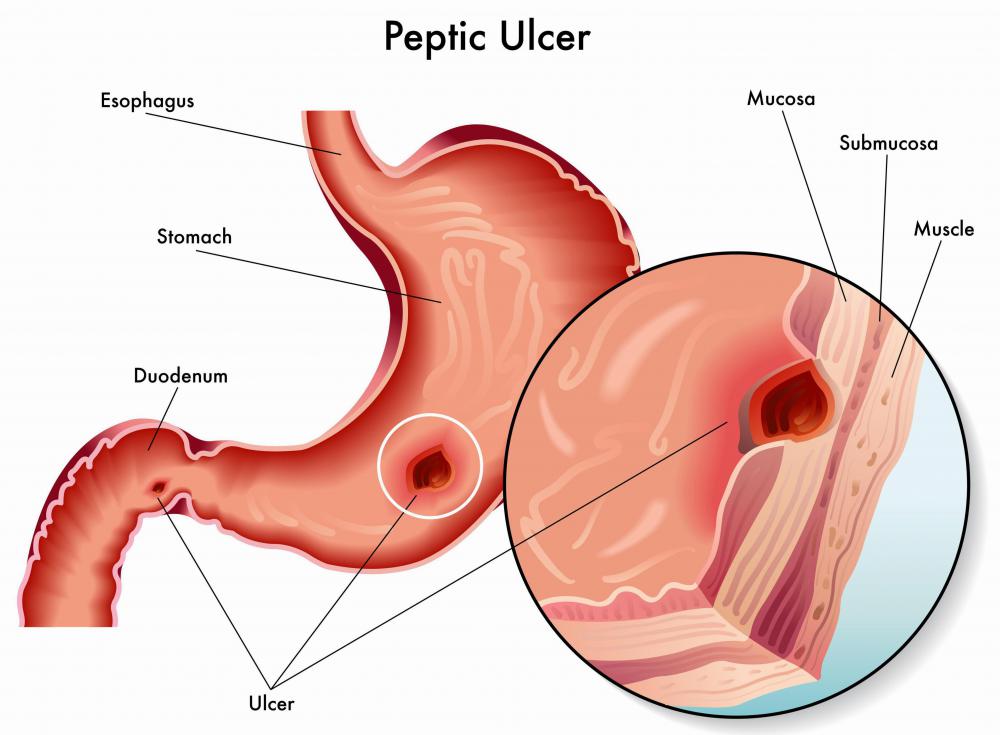At WiseGEEK, we're committed to delivering accurate, trustworthy information. Our expert-authored content is rigorously fact-checked and sourced from credible authorities. Discover how we uphold the highest standards in providing you with reliable knowledge.
What is Helicobacter Pylori?
Helicobacter pylori is a variety of bacteria that can cause severe infections and diseases if present in the stomach. The bacteria is notable in that it took over 100 years from its discovery to be associated with the illnesses it can cause. Ulcers, gastritis, and some stomach and intestinal cancers can all be caused by Helicobacter pylori infections.
In 1875, German scientists G. Bottcher and M. Letulle suggested that ulcers could be caused by bacteria. They couldn’t prove their theory, due to the inability to culture the bacteria they though responsible, and their results were largely ignored by the scientific community. About 20 years later, additional support was found by Italian researchers after discovering a helix-shaped bacteria growing in the stomach of dogs. Yet not until nearly a century later was the theory fully researched and developed.

Two Australian scientists, Robin Warren and Barry Marshall, began extensive research on the bacteria in 1981. Unlike in the original research by Bottcher and Letulle, Warren and Marshall were successfully able to culture the bacteria for study. The methods of the Australian team were radical, including an experiment where Marshall ingested samples of the bacteria to see if it would induce stomach problems. The risky experiment was successful, and Marshall and Warren were able to prove that the bacteria was also treatable with antibiotics. For their work on the discovery and properties of Helicobacter pylori, Marshall and Warren received the 2005 Nobel Prize for Medicine.

Helicobacter pylori can often be identified through blood or breath testing. An endoscopy may also be performed to confirm findings. In this procedure, a small tube is inserted down the throat and into the stomach, where samples of material are obtained. Once the presence of the bacteria is confirmed, a doctor can choose which antibiotic treatment best suits the patients needs.

The bacteria is considered a cause of many diseases. Peptic and gastric ulcers are often a result of a Helicobacter pylori infection. Chronic dyspepsia that is not a result of ulcers may also be caused by the bacteria. Some studies suggest that 70-90% of stomach cancers are caused by Helicobacter pylori infections. Despite these frightening illnesses, many people who have the bacteria in their stomach have no symptoms and may not encounter any problems.

Helicobacter pylori enters the system in a variety of ways. It is a contagious bacteria that can be found in contaminated food or water. Some studies also suggest that it can be passed through oral contact, such as kissing, from an infected person to a non-infected person. Maintaining a clean and hygienic environment can help avoid contamination. Some estimates suggest that about 4 billion people, or two-thirds of the population, are infected with the bacteria.

If you experience frequent stomach pain, heartburn, or consistent vomiting, experts recommend that you contact a doctor regarding testing for Helicobacter pylori. Although the vast majority of those who have the bacteria are asymptomatic, unusual stomach-related symptoms should be treated with caution. Many strains of the bacteria are treatable with antibiotics, which can stop the infection before it has a chance to cause additional problems.
AS FEATURED ON:
AS FEATURED ON:















Discussion Comments
"It is a contagious bacteria that can be found in contaminated food or water"
This is merely speculative and no direct example of this has been shown. Though it would make sense that this is the route of fecal/oral, it has not been shown.
Post your comments